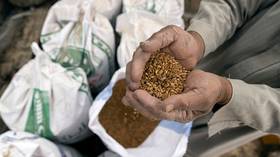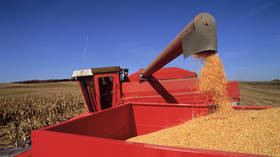Putin responds to claims about world hunger

Western nations are deliberately stirring up tensions regarding Ukrainian grain exports, Russian President Vladimir Putin said on Friday during a BRICS+ video conference. He was responding to comments by German Foreign Minister Annalena Baerbock, who has accused Moscow of holding the whole world “hostage” by blocking Ukrainian grain shipments.
Putin said Russia is not impeding exports, and criticized the West for its “cynical attitude” towards the food supply of the developing nations, which have been worst affected by soaring prices. He said rising inflation in the West was “a result of their own irresponsible macroeconomic policies.”
Moscow is ready to provide free passage to international waters for ships carrying grain, Putin said, adding that Russia had reached an “understanding” on that issue with the UN Secretariat.
The Russian president suggested that the Ukrainian military should demine the country’s ports to further facilitate exports, however, and said “a constructive approach on Kiev’s part” is the only thing that is lacking.
According to the president, Russia itself may be able to export between 37 and 50 tons of grain this year.
Earlier on Friday, Baerbock blamed Moscow for the looming food crisis at a conference in Berlin. Russia is “deliberately” using global hunger as “a weapon,” the minister said, claiming that Moscow had taken “the whole world hostage.”
The German minister also spoke about a potentially “life-threatening wave” of hunger that the world is facing, since around 345 million people are currently threatened by food shortages. The crisis has been a result of a number of factors like droughts and various regional conflicts, as well as the fallout from the Covid-19 pandemic, Baerbock admitted. However, she claimed it was Russia that “made a tsunami out of this wave.”
Her words have sparked an angry reaction from Moscow. Russian Foreign Ministry spokeswoman Maria Zakharova has said on Telegram that “using hunger as a weapon” is “Germany’s historical tradition,” apparently referring to crimes committed by the Nazis. Former Russian president, Dmitry Medvedev, also pointed to the blockade of the city of Leningrad (St. Petersburg) by the Nazis during World War II, which lasted for 900 days, causing massive hunger in the city, and claiming the lives of almost 700,000 people.
Zakharova also pointed to the fact that Germany had continued to actively import food after the start of the Russian military operation in Ukraine, despite concerns about its potential consequences for global food security. March alone saw Germany import food worth €3.4 billion ($3.59 billion), she said, citing data provided by the Trading Economics website.
The EU has repeatedly expressed concerns over the prospect of a food crisis that could break out if Ukrainian grain does not reach its traditional importers. Ukraine, a major grain producer, has been unable to export its grain by sea due to the ongoing conflict in the country, with an estimated 22 million to 25 million tons of grain currently stuck in the country’s ports.
The Western nations have blamed Russia for blocking the ports. Moscow has repeatedly stated it would guarantee safe passage for grain shipments if Kiev clears its ports of mines. It also suggested exporting the grain through the Russian-controlled ports of Berdyansk and Mariupol.
Meanwhile, Germany has suggested setting up a test corridor for exporting Ukrainian grain by rail through Poland. “Germany plans to facilitate this, in particular with the help of German railways,” Berlin’s ambassador to Ukraine, Anka Feldhusen, said on Monday.














